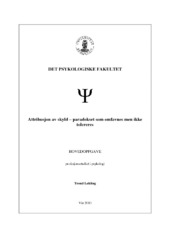| dc.contributor.author | Løkling, Trond | |
| dc.date.accessioned | 2010-09-08T08:14:46Z | |
| dc.date.available | 2010-09-08T08:14:46Z | |
| dc.date.issued | 2010-04-15 | eng |
| dc.date.submitted | 2010-04-15 | eng |
| dc.identifier.uri | https://hdl.handle.net/1956/4107 | |
| dc.description.abstract | Attribution deals with how people understand and explain the reason for themselves and their surroundings. Attribution research has long sought to explain the elements that contribute to this process. What this research has been unable to explain are the inconsistent attributions we humans do. The present paper relates this element of inconsistency to Borderline Personality disorder’s apparent aversion to guilt. At the same time research has indicated that this group seems to embrace this feeling. It is discussed how human attribution of guilt, can contribute to understand this apparent paradox. In the light of an intersubjective framework, this group's interpersonal difficulties are discussed in light of conditions such sham, transfe-rence, control and perspective taking. These factors are discussed, concluding that people with borderline personality disorder seem to have an attribution tendency characterized by an "all or nothing" attribution of guilt in interpersonal contexts. | en_US |
| dc.description.abstract | Attribusjon omhandler hvordan mennesker forstår og årsaksforklarer seg selv og sine omgivelser. Attribusjonsforskningen har lenge søkt å forklare elementer som bidrar i denne prosessen. Det denne forskningen har hatt problemer med å forklare er de inkonsekvente attribusjonene vi mennesker gjør. Forskning har funnet støtte for at mennesker med emosjonelt ustabil personlighetsforstyrrelse utviser særlig inkonsistent attribusjon. Dette elementet av inkonsekvens knytter denne oppgaven opp mot denne gruppens tilsynelatende aversjon mot skyld, samtidig som de virker å omfavne denne følelsen. I lys av en intersubjektiv forståelsesramme, blir denne gruppens mellommenneskelige vansker belyst gjennnom forhold som skam, overføring, kontroll og perspektivtaking. Disse forholdene blir diskutert, og oppgaven konkluderer i retning av at borderline gruppen tilsynelatende har en attribusjonstil kjennetegnet av "alt eller intet" tilskriving av skyld i interpersonlige kontekster. | en_US |
| dc.format.extent | 825063 bytes | eng |
| dc.format.mimetype | application/pdf | eng |
| dc.language.iso | nob | eng |
| dc.publisher | The University of Bergen | eng |
| dc.subject | Borderline | eng |
| dc.subject | Guilt | eng |
| dc.subject | Attribusjon | nob |
| dc.subject | Intersubjektiv teori | nob |
| dc.title | Attribusjon av skyld - paradokset som omfavnes men ikke tolereres | nob |
| dc.type | Master thesis | |
| dc.rights.holder | Copyright the author. All rights reserved | |
| dc.rights.holder | The author | eng |
| dc.description.localcode | PSYK300 | |
| dc.description.localcode | PRPSYK | |
| dc.subject.nus | 736102 | eng |
| dc.subject.nsi | VDP::Samfunnsvitenskap: 200::Psykologi: 260 | nob |
| fs.subjectcode | PSYK300 | |
